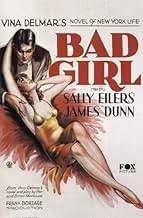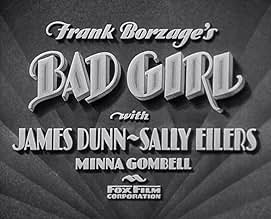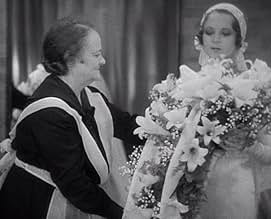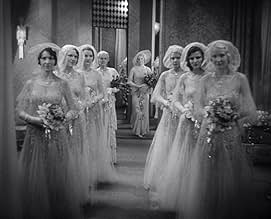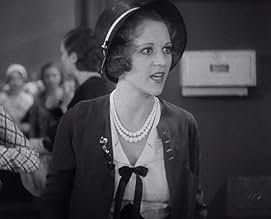IMDb-BEWERTUNG
6,4/10
1759
IHRE BEWERTUNG
Füge eine Handlung in deiner Sprache hinzuTwo adolescents fall in love and are wed, but misunderstandings born from a lack of trust and communication haunt their marriage.Two adolescents fall in love and are wed, but misunderstandings born from a lack of trust and communication haunt their marriage.Two adolescents fall in love and are wed, but misunderstandings born from a lack of trust and communication haunt their marriage.
- 2 Oscars gewonnen
- 6 Gewinne & 1 Nominierung insgesamt
Frank Austin
- Upstairs Tenement Neighbor
- (Nicht genannt)
Irving Bacon
- Expectant Father
- (Nicht genannt)
William Bailey
- Expectant Father of Twins
- (Nicht genannt)
Sue Borzage
- Unknown
- (Nicht genannt)
Jesse De Vorska
- Expectant Father
- (Nicht genannt)
Bud Eilers
- Man Outside Candy Shop
- (Nicht genannt)
Edward Hearn
- Male Nurse
- (Nicht genannt)
Aggie Herring
- Seamstress
- (Nicht genannt)
Claude King
- Dr. Burgess
- (Nicht genannt)
Louis Natheaux
- Mr. Thompson
- (Nicht genannt)
Sarah Padden
- Mrs. Gardner
- (Nicht genannt)
Lorin Raker
- Male Nurse
- (Nicht genannt)
Empfohlene Bewertungen
Bad Girl is another of Frank Borzage's romantic dramas of the trials and tribulations of lovers usually caught in circumstances and forces beyond their
control. In this case it's the Great Depression and their own attitudes about
romance itself.
Their attitudes being that romance is just a lot of bunk. But attitude or not James Dunn who was making his feature film debut and Sally Eilers are in love in spite of themselves.
I'm not quite sure why the film is entitled Bad Girl since there really isn't nothing bad about Eilers at all. Possibly her original attitude though that is quickly corrected. These are just two people trying to get by, but they always seem to misjudge attitudes because of first impressions and say the wrong things at time.
Take for instance the new apartment that Dunn uses all his savings in to impress Eilers. He says exactly the wrong thing about the two of them living only for today. That's just at the time she was about to break the news that wasn't to be two any more, but three.
Dunn really loves her. How many husbands to earn an extra couple of dollars would go out and try to go 4 rounds with a professional prizefighter? Charles Sullivan proves to be a good guy however.
So does Claude King as the obstetrics specialist who does Dunn a solid when Dunn wants him for his wife's delivery. None but the best as Dunn beautifully carries off a scene breaking down begging for King's services.
The film adapted from a Broadway play of the previous year won an Oscar for adapted screenplay. It also won for Frank Borzage an Oscar for Best Director.
Today's audiences might get a kick out of the prices and the amounts needed for many things. Inflation has come a long way since. Still the themes are universal and I think Bad Girl holds up well today.
Their attitudes being that romance is just a lot of bunk. But attitude or not James Dunn who was making his feature film debut and Sally Eilers are in love in spite of themselves.
I'm not quite sure why the film is entitled Bad Girl since there really isn't nothing bad about Eilers at all. Possibly her original attitude though that is quickly corrected. These are just two people trying to get by, but they always seem to misjudge attitudes because of first impressions and say the wrong things at time.
Take for instance the new apartment that Dunn uses all his savings in to impress Eilers. He says exactly the wrong thing about the two of them living only for today. That's just at the time she was about to break the news that wasn't to be two any more, but three.
Dunn really loves her. How many husbands to earn an extra couple of dollars would go out and try to go 4 rounds with a professional prizefighter? Charles Sullivan proves to be a good guy however.
So does Claude King as the obstetrics specialist who does Dunn a solid when Dunn wants him for his wife's delivery. None but the best as Dunn beautifully carries off a scene breaking down begging for King's services.
The film adapted from a Broadway play of the previous year won an Oscar for adapted screenplay. It also won for Frank Borzage an Oscar for Best Director.
Today's audiences might get a kick out of the prices and the amounts needed for many things. Inflation has come a long way since. Still the themes are universal and I think Bad Girl holds up well today.
Note: some scenes described in detail.
As usual for Borzage, this is full of sentiment, and the details of the plot are deadly. Never was the development of misunderstandings between two inarticulate people more aggressively, one might say more ruthlessly, pursued. When they're not playing "Gift of the Magi" (he giving up the dream of his own radio store for the big apartment he thinks she wants), they're busy each thinking that the other doesn't really want the baby. And how could Borzage resist milking the maternity ward scene, with its inevitable ethnic cross-section, older woman, and troubled mother. And here's another version of that typical pre-Code era film pair, the beautiful girl and the unhandsome blow-hard boob.
All that said, this is still a very good film in spite of itself, certainly deserving of its Academy Award nomination for Best Picture. Borzage constantly redeems himself at the worst moments. A prime example: the evening before the baby's due Jimmy goes out to fight four rounds of preliminaries at $10 a round to pay the doctor. Sally is lying at home, convinced that he's with his drunken friends, or worse, and no longer loves her. Dunn's opponent is a mean-looking, cynical, paunchy guy who's about to knock him out in the second round. Oh, the ironic cross-cutting: he's getting the crap beat out of him, while she lies in bed, anxious and bitter. But, in a clinch, Jimmy begs the pug not to knock him out because his wife's going to have a baby. Why didn't you say so, says the obliging pug, I've got two of my own. In an amusing moment they chat away while pretending to lambaste each other. This takes the curse off the sentimental plot maneuvering.
And there are a lot of other fine sequences, too. The film starts with Eilers in a fancy wedding gown, being attended to by a dresser. She's so nervous, she tells best-friend Gombell, who's dressed as a bridesmaid. As they do the formal bride's walk through the phalanx of bridesmaids, in the corner of the screen one sees part of a tray of dirty dishes being carried by a waiter. Gradually the camera pulls back to show that they're modeling the gowns for a bunch of lecherous buyers. Then they go to Luna Park (nice shots of the park). Throughout these early scenes there are plenty of sharp pre-Code wisecracks about how men only have one thing on their minds. Funny, breezy stuff. They meet Dunn on the ferry on the way home, the first guy that doesn't make a pass. The scene shifts to the couple sitting at the foot of her rooming-house stairwell. As they talk, an old hen-pecked lush comes down the stairs, and an older woman uses the hall phone to tell her sister that their mother has just died. That may be pouring the milieu on a bit thick, Borzage style, but this scene is beautifully played by Eilers and by the older woman and is quite affecting. Later, when Eilers stays in Dunn's room (no hanky-panky, it seems) and he asks her to marry him, her brother kicks her out of the house, and Gombell, the brother's gal, walks too. (Single-mom Gombell's little boy is a terror. In the morning he won't scram: "I want to see Dotty get out of bed.") Sally is sure that Jimmy will desert her at the alter, and that's the beginning of all the tear-jerking plot elements.
But the film goes beyond those elements with a richness of detail, a generous painting of daily life in the city during the Depression. And, when all's said and done, what really makes the film, and where Borzage ultimately redeems himself, is in the performances. Eilers, who somehow never got the recognition she deserved, is beautiful and gives a strong, sensitive, emotional performance--for my money a more appealing one than most of Janet Gaynor's work for Borzage. Gombell, another undervalued thirties player, is really fine as the tough but good-natured pal, who doesn't let Dunn's dislike of her color her opinion of him as a good husband for Eilers. Her performance goes beyond the requirements of the script in very subtle ways. And Dunn, well, he plays the typical early-thirties boob of a husband, but even he has a bravura scene when he breaks down while having to beg the expensive doctor to handle his wife's childbirth. Borzage films are always full of sentiment, but not always honest sentiment. This scene with the doctor is full of sentiment, but it's honestly handled, and one can say the same for the whole film.
As usual for Borzage, this is full of sentiment, and the details of the plot are deadly. Never was the development of misunderstandings between two inarticulate people more aggressively, one might say more ruthlessly, pursued. When they're not playing "Gift of the Magi" (he giving up the dream of his own radio store for the big apartment he thinks she wants), they're busy each thinking that the other doesn't really want the baby. And how could Borzage resist milking the maternity ward scene, with its inevitable ethnic cross-section, older woman, and troubled mother. And here's another version of that typical pre-Code era film pair, the beautiful girl and the unhandsome blow-hard boob.
All that said, this is still a very good film in spite of itself, certainly deserving of its Academy Award nomination for Best Picture. Borzage constantly redeems himself at the worst moments. A prime example: the evening before the baby's due Jimmy goes out to fight four rounds of preliminaries at $10 a round to pay the doctor. Sally is lying at home, convinced that he's with his drunken friends, or worse, and no longer loves her. Dunn's opponent is a mean-looking, cynical, paunchy guy who's about to knock him out in the second round. Oh, the ironic cross-cutting: he's getting the crap beat out of him, while she lies in bed, anxious and bitter. But, in a clinch, Jimmy begs the pug not to knock him out because his wife's going to have a baby. Why didn't you say so, says the obliging pug, I've got two of my own. In an amusing moment they chat away while pretending to lambaste each other. This takes the curse off the sentimental plot maneuvering.
And there are a lot of other fine sequences, too. The film starts with Eilers in a fancy wedding gown, being attended to by a dresser. She's so nervous, she tells best-friend Gombell, who's dressed as a bridesmaid. As they do the formal bride's walk through the phalanx of bridesmaids, in the corner of the screen one sees part of a tray of dirty dishes being carried by a waiter. Gradually the camera pulls back to show that they're modeling the gowns for a bunch of lecherous buyers. Then they go to Luna Park (nice shots of the park). Throughout these early scenes there are plenty of sharp pre-Code wisecracks about how men only have one thing on their minds. Funny, breezy stuff. They meet Dunn on the ferry on the way home, the first guy that doesn't make a pass. The scene shifts to the couple sitting at the foot of her rooming-house stairwell. As they talk, an old hen-pecked lush comes down the stairs, and an older woman uses the hall phone to tell her sister that their mother has just died. That may be pouring the milieu on a bit thick, Borzage style, but this scene is beautifully played by Eilers and by the older woman and is quite affecting. Later, when Eilers stays in Dunn's room (no hanky-panky, it seems) and he asks her to marry him, her brother kicks her out of the house, and Gombell, the brother's gal, walks too. (Single-mom Gombell's little boy is a terror. In the morning he won't scram: "I want to see Dotty get out of bed.") Sally is sure that Jimmy will desert her at the alter, and that's the beginning of all the tear-jerking plot elements.
But the film goes beyond those elements with a richness of detail, a generous painting of daily life in the city during the Depression. And, when all's said and done, what really makes the film, and where Borzage ultimately redeems himself, is in the performances. Eilers, who somehow never got the recognition she deserved, is beautiful and gives a strong, sensitive, emotional performance--for my money a more appealing one than most of Janet Gaynor's work for Borzage. Gombell, another undervalued thirties player, is really fine as the tough but good-natured pal, who doesn't let Dunn's dislike of her color her opinion of him as a good husband for Eilers. Her performance goes beyond the requirements of the script in very subtle ways. And Dunn, well, he plays the typical early-thirties boob of a husband, but even he has a bravura scene when he breaks down while having to beg the expensive doctor to handle his wife's childbirth. Borzage films are always full of sentiment, but not always honest sentiment. This scene with the doctor is full of sentiment, but it's honestly handled, and one can say the same for the whole film.
A man and woman get married, she gets pregnant, and then the two of them spend the rest of the movie wondering if the other really wants to have a baby. They could just talk to each other about it I suppose, but then there wouldn't be a reason for this film's existence.
"Bad Girl" is a bit of a curio in that it won Oscars for Best Director (Frank Borzage) and Best Writing (Adaptation) at the 1931-32 Academy Awards, but who's even heard of this movie now? It's not very memorable, and it's a testament to the power of the Academy Awards, whether or not you personally give them any credence, that films like this are kept afloat in front of modern-day audiences based on the fact that they won some Oscars back in the day. That's certainly the motive for my seeking it out, whereas any number of other early talkies that are no better or worse than this one fade into obscurity.
James Dunn and Sally Eilers are pretty good, and talkies were still new enough that it's refreshing to find actors who knew how to act with sound as their medium. It's also fun to see movies from this time period because they give us a glimpse into what life was like during the Great Depression.
Many comments have said that the title is completely irrelevant to anything that happens in the movie. That's not entirely true. When Dunn first meets Eilers at Coney Island, they have a conversation where he mentions something about how everyone has both bad and good in them, and the idea that both husband and wife suspect the "bad" in each other drives much of their behavior throughout the rest of the film. But I do agree that the theme isn't explored very fully, and it is a misleading title.
In addition to the two Oscars it won, "Bad Girl" was nominated for Best Picture.
Grade: B
"Bad Girl" is a bit of a curio in that it won Oscars for Best Director (Frank Borzage) and Best Writing (Adaptation) at the 1931-32 Academy Awards, but who's even heard of this movie now? It's not very memorable, and it's a testament to the power of the Academy Awards, whether or not you personally give them any credence, that films like this are kept afloat in front of modern-day audiences based on the fact that they won some Oscars back in the day. That's certainly the motive for my seeking it out, whereas any number of other early talkies that are no better or worse than this one fade into obscurity.
James Dunn and Sally Eilers are pretty good, and talkies were still new enough that it's refreshing to find actors who knew how to act with sound as their medium. It's also fun to see movies from this time period because they give us a glimpse into what life was like during the Great Depression.
Many comments have said that the title is completely irrelevant to anything that happens in the movie. That's not entirely true. When Dunn first meets Eilers at Coney Island, they have a conversation where he mentions something about how everyone has both bad and good in them, and the idea that both husband and wife suspect the "bad" in each other drives much of their behavior throughout the rest of the film. But I do agree that the theme isn't explored very fully, and it is a misleading title.
In addition to the two Oscars it won, "Bad Girl" was nominated for Best Picture.
Grade: B
Bad Girl is included in the new Murnau/Borzage and Fox collection,and kudos to them for making it available! Though an excellent little slice of life film from the Depression Era, I definitely wouldn't say that it compares with Borzage's timeless silent romances, though Borzage's recurrent theme of love conquering all is here to.The lead actors,Sally Eilers, and James Dunn, both do fine jobs, especially Dunn, who paints a very realistic portrait of a "regular Joe", decent kind of a guy. His performance rings true, and he later made a comeback, winning the Oscar for Best Supporting Actor in A Tree Grows in Brooklyn.(1945) This is the story of a young couple's struggle to make it through marriage, finances, and becoming parents. The background story of what was considered "making it" in a poor economy is especially pertinent today. Dunn's character, Eddie Collins, thought it was opening his own radio shop, providing his wife with an elaborately furnished apartment, and getting her the best doctor for her delivery. Not so different from what young couples are facing today! The film is sometimes a bit too wordy, but the slang of the time is a hoot! As one of Borzage's smaller films, it's worth a watch.
An interesting little Borzage love story set during the Depression, detailing the struggles of young couple (Sally Eilers & James Dunn) with their hopes and dreams. Curiously Borzage won his second Oscar as Best Director for this oddly heady little movie and that's perhaps the only reason to watch it. It works as a timepiece of its era. But I definitely wouldn't call "Bad Girl" one of Borzage's best romances (in many ways it strikes me as turgid and unaffecting in several moments, and I didn't like the ending), but it is definitely worth catching if you are fan or a student of the director's sublime and unheralded oeuvre.
Wusstest du schon
- WissenswertesWilliam Pawley played the role of Dorothy's brother in the stage version, and reprises his role here in the film.
- PatzerAt 2:54, shadow of boom mic is visible across Dot's face.
- Zitate
Dorothy Haley: I gotta go upstairs now. You see, my mother's dead, and my brother's boss of the house. He gets sore when I stay out late. You know, he's careful for me. But as Edna says, you can't watch a girl hard enough to keep her good if she don't want to be.
- VerbindungenAlternate-language version of Marido y mujer (1932)
Top-Auswahl
Melde dich zum Bewerten an und greife auf die Watchlist für personalisierte Empfehlungen zu.
- How long is Bad Girl?Powered by Alexa
Details
- Laufzeit1 Stunde 30 Minuten
- Farbe
Zu dieser Seite beitragen
Bearbeitung vorschlagen oder fehlenden Inhalt hinzufügen


